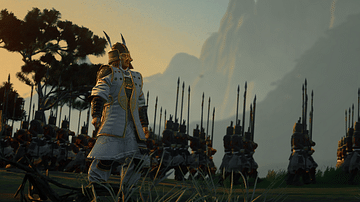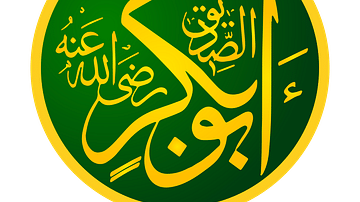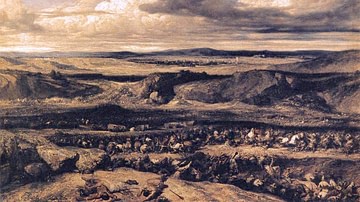Search Definitions
Browse Content (p. 125)

Definition
Richard II of England
Richard II of England reigned as king from 1377 to 1399 CE. The son of the late Edward the Black Prince (1330-1376 CE), Richard would succeed his grandfather Edward III of England (r. 1327-1377 CE), but as he was only 10 years of age, he...

Definition
Ancient Persian Art and Architecture
Persian art and architecture in the present day is associated with the nation of Iran and usually designated as beginning with the Achaemenid Empire (c. 550-330 BCE) but has an even longer history with its origins dating back to before the...

Definition
Battle of Red Cliffs
The Battle of Red Cliffs (also known as the Battle of Chibi, 208 CE) was the pivotal engagement between the forces of Northern China led by the warlord Cao Cao (l. 155-220 CE) and the allied defenders of the south under the command of Liu...

Definition
Chepstow Castle
Chepstow Castle, located in Monmouthshire, South Wales, was first built c. 1067 by William FitzOsbern and then significantly improved c. 1190 CE by Sir William Marshal (c. 1146-1219 CE), one of England's greatest ever knights who served four...

Definition
Tamar of Georgia
Tamar was the queen of Georgia from 1184 to 1213 CE. She is considered one of the greatest of medieval Georgia's monarchs, and she presided over its greatest territorial expansion, taking advantage of the decline of other major powers in...

Definition
Abu Bakr
Abu Bakr (l. 573-634 CE, r. 632-634 CE) was an early convert of Islam; he was a close friend and confidant of the Islamic Prophet Muhammad, and became the first caliph of the Islamic empire – a successor to Muhammad's temporal position but...

Definition
Edward the Black Prince
Edward of Woodstock (1330-1376 CE), better known as the Black Prince after his distinctive armour or martial reputation, was the eldest son of Edward III of England (r. 1327-1377 CE). Made the Prince of Wales in 1343 CE, Edward would fight...

Definition
Edward III of England
Edward III of England reigned as king from 1327 to 1377. Succeeding his father Edward II of England (r. 1307-1327) following his enforced abdication and then murder, Edward III would take revenge on his father's enemies, who included the...

Definition
Cimbri
The Cimbri were a tribe who lived in northern Jutland during the Roman era. Their ethnicity is enigmatic; scholars generally believe that the Cimbri were Germans, though others maintain that they were Celts. The late 2nd-century BCE migration...

Definition
Edward II of England
Edward II of England reigned as king from 1307 to 1327 CE. Succeeding his father Edward I of England (r. 1272-1307 CE), his reign saw a disastrous defeat to the Scots at Bannockburn in June 1314 CE, and the king's lack of political and military...